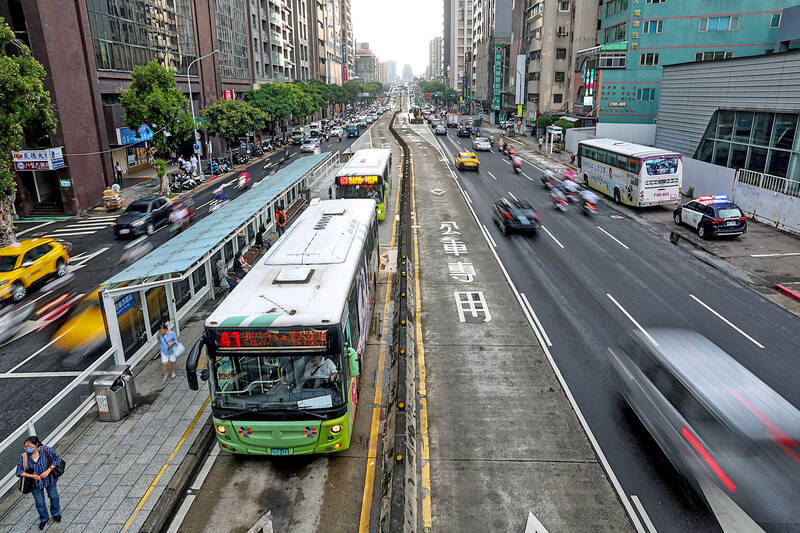The government aims to have 4,000 electric buses operating across Taiwan by the end of this year, as part of measures to curb air pollution caused by ultrafine particulate matter (UFP), the Ministry of Transportation and Communications (MOTC) said yesterday.
The plan was unveiled at a meeting of the legislature’s Social Welfare and Environmental Hygiene Committee, at which MOTC and Ministry of Environment officials briefed lawmakers on how they would implement the nation’s air pollution control policy after the EU last year began mandating the measurement of UFP across all of its member states.
Electrification of public transportation is a strategy of the government to achieve net zero emissions by 2050, the MOTC said.

Photo: CNA
The Executive Yuan in 2023 approved a budget of NT$64.3 billion (US$2.19 billion at the current exchange rate) to replace 11,700 gasoline and diesel-powered buses across Taiwan by 2030, with the MOTC providing NT$45.1 billion and the environment ministry providing NT$19.2 billion, it said.
As of last month, the nation had registered 2,028 licensed electric buses, while 1,260 were under construction, it said.
The Highway Bureau on March 27 approved a plan to subsidize local governments to procure 760 electric buses between them, it said.
More than 4,000 electric buses would be available by the end of this year, including those being made, the MOTC said.
Thirty-five percent of city bus fleets nationwide would be electrified by the end of the year, it said.
In its Global Air Quality Guidelines published in 2021, the WHO listed for the first time UFP as a factor that could increase the risk of systemic inflammation, cardiovascular diseases and respiratory illnesses, Deputy Minister of Environment Shen Chih-hsiu (沈志修) said.
The guidelines defined UFP as particulate matter with an aerodynamic diameter less than or equal to 0.1 micrometers (PM0.1).
The concentration of PM0.1 is typically expressed as the particle number concentration per unit volume of air, such as the number of particles per cubic centimeter, Shen said.
Medical groups on Tuesday urged the government to expand the control of PM0.1 from mobile sources after air pollution was ascertained to be one of 14 adjustable risk factors leading to dementia.
The environment ministry has been working with National Taiwan University since 2023 to monitor air quality in areas with heavy traffic in Taipei, and observe the spread of particulate and gaseous pollutants, Shen said.
The research team analyzed the data by factoring in weather conditions and traffic flow, he said.
The team found that approximately 90 percent of total particle volume in the atmosphere was PM0.1, he said.
It also identified public transportation as the main source of PM0.1, with the density spiking during peak traffic hours, he added.
PM0.1 behaved differently from PM2.5, which tended to have less variability, he said.
Nevertheless, Taiwan still needs more locally collected data to set the standard for PM0.1 density and to control pollution, Shen said.
The environment ministry has listed issues related to PM0.1 in its Air Quality Policy white paper, which would guide its air quality control plans for the next 10 years, Shen said.
As a pilot project, the environment ministry would begin monitoring PM0.1 densities in Taichung and Kaohsiung next year, he said.

NATIONAL SECURITY THREAT: An official said that Guan Guan’s comments had gone beyond the threshold of free speech, as she advocated for the destruction of the ROC China-born media influencer Guan Guan’s (關關) residency permit has been revoked for repeatedly posting pro-China content that threatens national security, the National Immigration Agency said yesterday. Guan Guan has said many controversial things in her videos posted to Douyin (抖音), including “the red flag will soon be painted all over Taiwan” and “Taiwan is an inseparable part of China,” while expressing hope for expedited “reunification.” The agency received multiple reports alleging that Guan Guan had advocated for armed reunification last year. After investigating, the agency last month issued a notice requiring her to appear and account for her actions. Guan Guan appeared as required,

Japan and the Philippines yesterday signed a defense pact that would allow the tax-free provision of ammunition, fuel, food and other necessities when their forces stage joint training to boost deterrence against China’s growing aggression in the region and to bolster their preparation for natural disasters. Japan has faced increasing political, trade and security tensions with China, which was angered by Japanese Prime Minister Sanae Takaichi’s remark that a Chinese attack on Taiwan would be a survival-threatening situation for Japan, triggering a military response. Japan and the Philippines have also had separate territorial conflicts with Beijing in the East and South China

A strong cold air mass is expected to arrive tonight, bringing a change in weather and a drop in temperature, the Central Weather Administration (CWA) said. The coldest time would be early on Thursday morning, with temperatures in some areas dipping as low as 8°C, it said. Daytime highs yesterday were 22°C to 24°C in northern and eastern Taiwan, and about 25°C to 28°C in the central and southern regions, it said. However, nighttime lows would dip to about 15°C to 16°C in central and northern Taiwan as well as the northeast, and 17°C to 19°C elsewhere, it said. Tropical Storm Nokaen, currently

PAPERS, PLEASE: The gang exploited the high value of the passports, selling them at inflated prices to Chinese buyers, who would treat them as ‘invisibility cloaks’ The Yilan District Court has handed four members of a syndicate prison terms ranging from one year and two months to two years and two months for their involvement in a scheme to purchase Taiwanese passports and resell them abroad at a massive markup. A Chinese human smuggling syndicate purchased Taiwanese passports through local criminal networks, exploiting the passports’ visa-free travel privileges to turn a profit of more than 20 times the original price, the court said. Such criminal organizations enable people to impersonate Taiwanese when entering and exiting Taiwan and other countries, undermining social order and the credibility of the nation’s